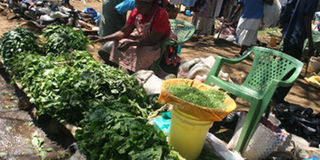Kenya roots for eating indigenous vegetables

A woman displays fresh traditional vegetables for sale at Oile market in Kisumu According to Kari, the consumption of indigenous vegetables is currently a paltry 3.7 per cent of all the greens consumed at any specified time, a figure viewed as too low given their nutritional value. PHOTO/FILE
What you need to know:
- According to Kari director Dr Ephraim Mukisira, indigenous vegetables are a good source of vitamins, which many people in urban areas lack, and so spend a lot of money on supplements to replace them.
- The indigenous crops also do not require a lot of inputs like fertilisers, and can be grown organically, unlike exotic ones.
Kenya plans to increase the consumption of indigenous vegetables in the next five years as a way of improving food security and the health of its growing population.
The country has embarked on a strategy to increase the acreage under indigenous vegetables by propagating more seeds and making them accessible to farmers at affordable prices.
Last year, the country’s lead research organisation, the Kenya Agricultural Research Institute (Kari), partnered with other international organisations to produce 1,700 kilogrammes of various indigenous seeds, which were distributed to farmers.
“We will continue propagating the seeds and providing agricultural expertise to farmers to help increase the intake of these important plants,” said Kari’s assistant director of horticulture and industrial crops, Dr Lusike Wasilwa.
According to Kari, the consumption of indigenous vegetables is currently a paltry 3.7 per cent of all the greens consumed at any specified time, a figure viewed as too low given their nutritional value.
Exotic vegetables, mainly kales and cabbages, account for more than 90 per cent of the total vegetables consumed in the country, and it is this trend that Kari is trying to reverse.
The research institution believes that increasing the acreage under indigenous vegetables and distribution of affordable seeds will help boost consumption to 50 per cent.
The research institution is working with farmers in Western, Central and Coastal regions to augment production of the crops.
Some of the indigenous vegetables being targeted are the African Nightshade, Spider Plant, Amaranth, stinging nettle, pumpkin leaves, cowpeas and Slender Leaf, all of which have been proven to have higher nutritional value than kale and cabbage.
FOOD SECURITY
The country’s food security status has remained unstable, partly blamed on overreliance on exotic food crops, which are more vulnerable to the vagaries of weather.
Scientists at Kari say consuming alternative crops can help improve the country’s food security status and also save the exchequer millions of dollars spent importing food.
Expenditure on imports, for example, increased from $15.48 billion in 2011 to $16.17 billion last year, with agricultural products, petroleum and capital goods taking a chunk of the budget.
“By consuming more indigenous vegetables, we not only improve the country’s food security but also improve the health status of the population given the crops’ nutritional value,” Dr Wasilwa said.
According to Kari director Dr Ephraim Mukisira, indigenous vegetables are a good source of vitamins, which many people in urban areas lack, and so spend a lot of money on supplements to replace them.
“Traditional vegetables are antioxidants and a source of roughage, which helps in digestion. They are also a source of micro-nutrients such as zinc, iron and manganese,” Dr Mukisira said.
According to Kari, the main challenge in popularising the vegetables has been the perception that such crops are poor man’s produce.
“It is the exotic ones that are associated with modernity and are considered food for urban dwellers,” said Dr Wasilwa.
As a result of these negative perceptions, getting seeds had been a challenge and many farmers have no alternative but to find them in the wild.
HEALTHY ALTERNATIVE
However, she said, there were efforts by Kari to encourage commercialisation of indigenous vegetables, adding that their demand is on the increase, as more people become conscious of their health status.
One of the major advantages indigenous vegetable seeds have over exotic ones is that they have a long dormancy period, which is important in agriculture.
“The seeds have a high concentration of inhibitors, which help them remain dormant for a long time. It is also a protection mechanism that allows the seeds to survive droughts,” Dr Wasilwa said.
The indigenous crops also do not require a lot of inputs like fertilisers, and can be grown organically, unlike exotic ones.
Dr Mukisira said increasing urbanisation has led to the adoption of diets that have a high content of fatty acids, which have been linked to metabolic diseases such as diabetes and high blood pressure.
The article first appeared in The East African




